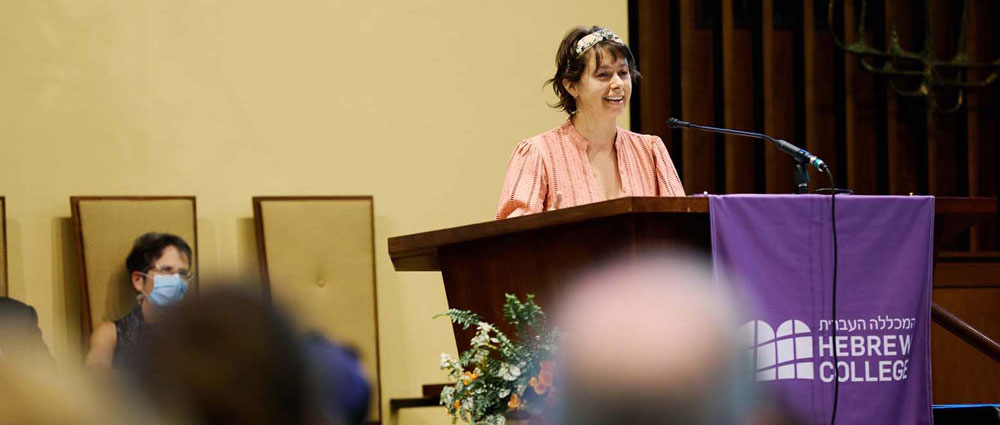News Highlights “Courage to speak in a wilderness”

At the beginning of the year, I had a meeting with the Dean of our school — and found out that I needed to fulfill a requirement I missed and, possibly begrudgingly, had to enroll in an online class called “Theories of 21st Century Jewish Education.” One week in the class, I learned about a theory called “transformational learning,” which describes effective learning to be learning that transforms someone’s inner meaning-scheme; not just an addition of information, but an impactful experience of learning that changes the way the learner makes sense of the world.
In the guidelines of this theory, the teachers’ task is to create a safe space where the learner can undergo disorientation, since this is the inevitable interim between meaning making schemes. In order to transform, the learner has to let go of their past schema of meaning making, and enter a period of disorientation before stabilizing one’s self in a new, altered and more fitting way of seeing the world. The goal of this style of learning is, in a certain sense, to bewilder the learner — leading them into their own wilderness and granting them tools to form something from the void there.
This week, in our yearly Torah reading cycle, we turn to a new Book, the Book B’midbar the book of being in the wilderness, midbar. The word for wilderness, midbar can also be read m’daber, which means “speaking.” The connection between the two meanings is widely commented on in our literature.
In Shemot Rabbah, in the 4th story of the 2nd chapter, our Sages suggest that Moshe was able to bring the Israelites from Egypt to the wilderness because of the merit of Avraham, and then they make a wild claim וְאֵין מִדְבָּר אֶלָּא דִּבּוּר — wilderness only signifies language, speech and desert collapse into one.
The word midbar is at once a vast desert where quiet rests deep into the traveler’s bones, where nature itself goes void in it’s empty harshness, and it is language, meaningful sound and words. Scholar, Avivah Zornberg questions, “How are we to understand such a meeting of words and knowledge in a world of absence? The wilderness bewilders; it undermines the very ability to speak, to know one’s own experience. It’s emptiness dwarfs the force of one’s imagination.”
The frontier of Jewish text seems to me an interface of this encounter between words & knowledge and a world of absence. Our creation myth holds that the animate world we inhabit was created by language, in a certain sense, the desert is composed of words, and so is a page of Talmud. Learning, so often for me, is entering into a wilderness of words with my chevrutah.
Wandering in a place that is at once speaking and entirely confounding. Either a page of text looks like language and my inner landscape is a wilderness, or I bring language to the text that then disappears into a wilderness. My text classes at Hebrew College facilitated this kind of transformational learning where the constant was a kind of bewilderment.
In my experience, my teachers offered a safe space in which to be disoriented while my inner meaning schemes transformed. I often found myself walking in this liminal void where my past understandings of the world no longer fit but I was yet to find some kind of comfort or new compass by which to orient myself.
The most powerful aspect of my experience at Hebrew College was that in this void place, where I felt I had no voice, no language, my teachers and chevrutot would ask me to speak. I can remember so many times in Talmud class with Jane when I would half raise my hand and utter something that seemed nonsensical to me before realizing I had no idea what I was saying and she would encourage me to speak even though I didn’t know, to talk in the place of void, she believed I had a voice where I couldn’t perceive one. Or times when my chevrutah and I would look to each other to make meaning and speak inside the void we entered into in our studies, we would bring a voice out from one another in a wilderness.
I have been bewildered, in a stunningly productive way by my learning here, and if I were left to my own devices I would be speechless in the void there, but the Hebrew College community repeatedly trusted that I had something to say. More than anything else, this place has given me courage to speak in a wilderness, and has offered me the tools to access bewilderment inside our sources. I thank you, so much, for asking me to speak today, and for trusting, over and over again, that I have a voicem — it has been a wilderness of healing, a language of trust.
Rabbi Genevieve Greinetz delivered this student address at Hebrew College Commencement on May 29, 2022. She was also ordained as a rabbi at ceremonies that day. Learn more about Hebrew College’s rabbinical program.

